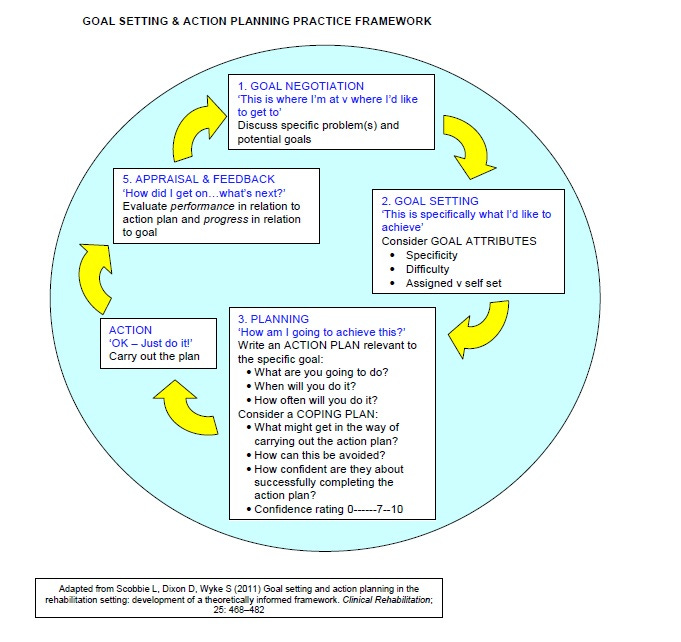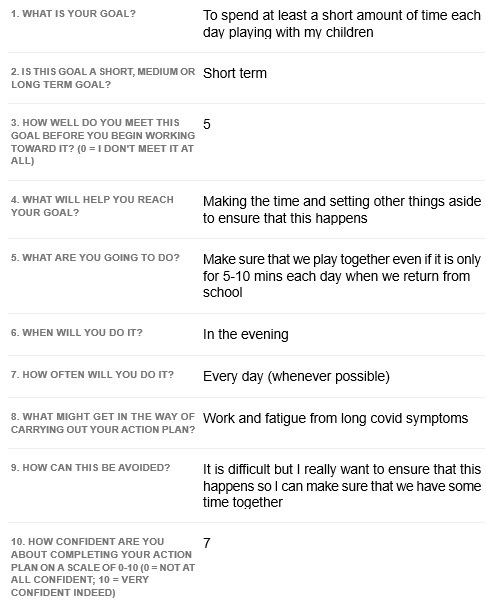Who is CBT4T Substack for?
The aim is for the CBT4T Substack to be a useful resource to anyone interested in CBT (Cognitive Behaviour Therapy) and how it is used in the CBT4T programme. As such, it is for:
Anyone supporting others who have tinnitus, such as Audiologists, Hearing Therapists, and those in a tinnitus supporting/advisory role
Anyone with tinnitus, whether they are already using the CBT4T programme or not yet enrolled
Setting explicit goals is an important aspect of achieving successful outcomes. Setting clear goals is fundamental when we wish to achieve any form of change and is an integral part of any process to help us achieve change. How will we measure we have achieved or not achieved what we set out to do, when we are unclear about where we are going?
If we are unclear about what we intend to achieve, we are likely to end up being disappointed.
Goal setting is part and parcel of any process intended to lead to change, including a Cognitive Behaviour Therapy (CBT) process; yet the task of goal setting is often one of the most challenging to us when we are in the midst of already challenging and difficult experiences.
Goal setting in CBT aims to make goals EXPLICIT i.e. “stated out loud” metaphorically speaking. If NOT made explicit, implicit assumptions lurk in the subconscious and cause lack of clarity, even confusion.
When do we formally set goals?
I remember all too well in my earlier days of clinical practice, eager to set my patients off on “the right track” following their assessment, goal setting was the first task to take a patient through. It was ALWAYS difficult!
The reason they found it difficult is not complicated. It was because they struggled to cope with the tinnitus noise, and wanted it gone! Hardly surprising then that the most frequently stated goal was something along the lines of “For tinnitus to go!”
Of course, both they and I knew this to be highly unlikely, so the goal immediately failed two of the SMART goal rules: “Achievable” and “Realistic”.
SMART goals are:
Specific
Measurable
Achievable
Realistic
Timely
Not only did this initial failure cause the goal setting task to seem “too difficult”; it undermined people’s confidence, adding to frustrations and fears they were already suffering.
To be useful, goal setting should be approached at the right time in the process. In the CBT4T process, goal setting begins in Element 2 where the Cognitive therapy component of the process begins, following the early re-regulation of the Autonomic Nervous System that has begun to take effect throughout Element 1 (Stages 1-3).
How do we go about setting goals that are most likely to be successful?
We define clearly the direction we want to go
We make EXPLICIT what we want to achieve
We ensure our chosen goals are SMART
To meet the ‘Timely’ component of SMART, it is helpful to use a framework – the simple framework I use is:
Short term goals
Medium term goals
Long term goals
Consider these broadly in terms of weeks and months. You are setting these goals for yourself; you are allowed to be flexible with them. For example, it may be you choose something as a medium term goal, find you enjoy the activity you set yourself, achieve it sooner than you expected so it turns out to be a short-term goal!
Things can work out the other way too. None of us can predict the future, so it may be that something you believed could be achieved short term (just a few weeks) is taking longer. As long as you have largely followed your action plan to meet the goal, there is nothing wrong with making an adjustment, re-evaluating the goal as medium or long term.
When you are beginning to set goals, choose at least one of each when you begin, and preferably more short term than medium and long term goals as you continue. This way, success comes quite quickly, giving you confidence to build on “the wins” feeling motivated and confident about achieving your medium and long term goals.
A good way to identify several short term goals, is to work out how to break a wanted goal down in to easily achievable stages.
Popular goals around listening and reading
“Listening” is a commonly identified goal – be that listening to music, listening to a favourite radio or TV show; “reading” is another – maybe reading a book, or a favourite magazine or newspaper.
Set short, achievable times for “listening” or “reading”.
For example: “Listen to music/radio/TV for 5 minutes every day”
Perhaps every day may prove difficult due to home or work responsibilities. So be fair to yourself, for example: “Listen to music/radio/TV x number of times a week” (where feasible, be even more definitive e.g. on Monday, Wednesday, Friday, Saturday).
Once you’ve met your goal of 5 minutes consistently several times over, extend the time period to what you believe to be achievable – it may be 10 minutes for example, and this would become your next short term goal.
If your goal is about reading a book, set yourself a goal of reading a specific book that you want to read, but break it down in to small sections, depending on what you think might be achievable as a first goal.
For example: “Read one page of x book every day”, or “Read one page of x book at least 4 days a week/on Tuesdays, Wednesdays, Thursdays and Fridays in the evenings (or whenever you think is your best time for reading).
And it doesn’t matter how limited you need to make the goal. Keep it REALISTIC, For example, where reading was once an enjoyable past time, and has become an activity you haven’t done because of difficulty concentrating because of tinnitus (this is very common indeed!), even a page might feel too much! Have a single paragraph as your initial goal. You can extend beyond a single paragraph as your next goal.
Values Based Action
One of the most useful – and logical – ways of identifying and successfully achieving a goal is to choose goals that you personally value. Listening and reading are probably the most common past times that people choose because they miss having them in their life. Cycling is another very common activity that people have enjoyed for years but have stopped doing – sometimes because they’ve felt too depressed (because of tinnitus); sometimes because they worry it will “make tinnitus worse”, either because of wind noise, sometimes because physical activity increases arousal and they fear the impact on their tinnitus. A first step, short term goal would be to go for a very short (5-10 minute) bike ride X times every week. Include where you will ride in the goal, e.g. “Ride down X street and back”. It would be similar when choosing walking as a goal.
Start off small > achieve success > extend a little > achieve success > extend some more.
Choosing activities that you enjoy is a concept known as Values Based Action, and comes from one of the third wave Cognitive Behavioural Therapies: Acceptance & Commitment Therapy (ACT). The tools for Values Based Action goal setting is detailed in the CBT4T course content (Stage 5b).
Goal Setting & Action Planning Framework
Reference: Scobie, Dixon, Wyke (2011) Goal setting & action planning in the rehabilitation setting: Development of a theoretically informed framework, Clinical Rehabilitation, 25, 468-482
Particularly where goal setting and planning how to meet goals is new to you, a template is really helpful. This is the referenced framework used in the CBT4T programme.
Choose goals that pertain to your wellbeing rather than be focused around tinnitus
Bear in mind that reduced conscious awareness of tinnitus is the objective of the CBT4T process.
However, although it may feel counter-intuitive, choosing goals that explicitly use tinnitus as the locus to change, is likely to delay progress rather than be of help.
To better understand why, consider the perspective you would be bringing to the goal.
The definition of perspective (noun) is:
“A particular perspective is a particular way of thinking about something, especially one that is influenced by your beliefs or experiences”
(Ref: https://www.collinsdictionary.com/dictionary/english/perspective)
Let’s examine the perspective you are bringing to a goal that has tinnitus as the locus to change, for example: “To not hear tinnitus”, or “To become less aware of tinnitus”.
Immediately, tinnitus is central and significant, due to the meaning attributed to tinnitus because of the negative experiences it has brought in to your life - so much so that you needed to seek help. Simply because you are thinking of tinnitus as you are thinking about the “tinnitus goal”, the likely effects are that your tinnitus sounds louder (than it was before you thought of the goal), your attention is taken up by it and you find yourself monitoring it. I even hesitate to include this paragraph, as it’s likely this is happening even as you read it!
So moving quickly on…. Neither of those goal statements meet SMART criteria either:
“To not hear tinnitus” – implies to not hear tinnitus AT ALL – fails three of the five SMART criteria - Achievable, Realistic, Timely
“To become less aware of tinnitus” – how much less aware? by when? – fails three of the five SMART criteria - Specific, Measurable, Timely
Always make your goals about activities you enjoy!
Past examples of Goal & Action Planning
To conclude, below are three examples of goal action planning sent in by past users of CBT4T.
Short term example:
Medium term example:
Long term example:
Additional links that may be of interest
CBT4T website: www.tinnituseprogram.org
Tinnitus Functional Index: www.tinnituseprogram.org/tfi.html
To view the CBT4T full programme Outline - you can enrol here too: https://courses.tinnituseprogram.org/cbt4t-2025
To view CBT for Tinnitus Distress for Audiologists and Hearing Therapists https://courses.tinnituseprogram.org/cbt-for-tinnitus-distress
To view CBT for Tinnitus for Advisors & Support Workers (soon to be updated) https://courses.tinnituseprogram.org/tinnitus-advisors
26/6/25







Very good article about setting goals in the context of bothersome tinnitus. When I started the CBT4T-programme in spring 2023, one of my goals was to be able to read fiction without being unduly disturbed by my tinnitus. In 2023, I read only five books, but in 2024, when going through the course had significantly promoted habituation, I read over 30 books! Thanks to the programme, I was able to enjoy reading again!👍